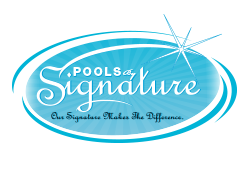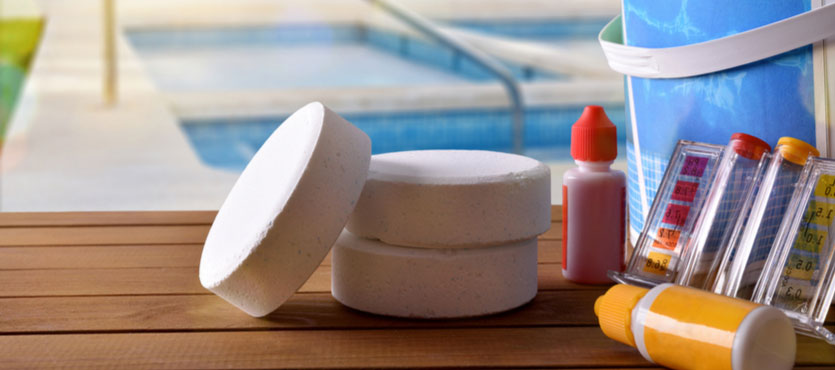So, you’re trying to decide between a saltwater system and a traditional chlorine pool—well, here are some straight facts to help you make the right decision for your pool.
First thing’s first—both a saltwater system and a traditional chlorine pool rely on chlorine to kill off bacteria in the water. The main difference is how chlorine is generated.
Traditional Chlorine Pool: A Closer Look at Chlorine Tablets
Chlorine tablets have been the go-to pool cleaning tool for decades because they are effective when it comes to disinfecting pool water. Plus, they are easy to use and great at fighting germs, bacteria, and algae growth.
Chlorine tablets are tossed into an external automatic feeder or an in-pool floating disbursement device. Of the two, the external feeder is considered the most efficient system for pools. An external feeder works whenever the pump is on and causes water to flow over tablets so that chlorine disperses through the water. A dial allows you to adjust how much water flows over tablets, and therefore, how much chlorine reaches the water.
A floating dispenser involves tablets floating on the surface of the pool that dissolve as water floats over them. This system is better for small pools because it can leave areas in big pools without adequate chlorine coverage. Feeders need to be refilled once every 1 to 3 weeks.
What’s in Chlorine Tablets?
In general, chlorine tablets contain 99% trichloro-S-triazinetrione. There are stabilized and non-stabilized tablets available; stabilized tablets have additives to help prevent chlorine loss related to UV rays. Certain types of tablets contain additional ingredients to help soften water, prevent scaling, etc.
Benefits of Chlorine Tablets:
- Works for all pool types, from commercial to residential pools
- Easy system to use and maintain
- There are tablet options to help prevent chlorine loss due to UVA rays, and so forth.
Drawbacks to Chlorine Tablets:
- Must buy and store chemicals
- You’ll need to refill chlorine dispenser every 1 to 3 weeks.
- Build-up is common overtime, which means you’ll have to drain and refill your pool to obtain stabilized levels.
Salt Water Pool: A Closer Look at Chlorine Generators
Salt water pools have become more popular over the last 20-years or so. But, if you’re trying to avoid chlorine, you should know that a saltwater pool still utilizes chlorine to kill bacteria it just generates chlorine differently. In fact, the same amount of chlorine is necessary in a salt water pool. But, instead of adding chlorine tablets, a chlorine generator is responsible for transforming salt in the water into chlorine. The process is comparable to how chlorine tablets are made in a factory.
Chlorine generators come with a control panel you can adjust with the push of a button to produce chlorine based on current levels, usage, time of year, etc. Instead of altering how much water flows over tablets, you change the frequency and duration the chlorine generator cell remains on. High-end generators automatically adjust, while more commonly used models require user interaction—aka, the push of a button.
Chlorine generators cost more money, although they come at a variety of price points and with unique features. The power center typically lasts between five and ten years, while the cell needs to be replaced about once every two to five years.
Does salt water taste weird or make your eyes burn?
Low levels of salt are required, and at these levels it’s unlikely you’ll even know it’s there. You shouldn’t experience burning eyes, and the water shouldn’t taste like salt.
Benefits of a salt water pool:
- Softer/silkier water texture due to the presence of salt in the water
- Low levels of salt can help prevent skin from drying out
- Easy to monitor and adjust chlorine levels (some systems will do it for you)
- No need to buy or store heavy chlorine tablets
Drawbacks to a salt water pool:
- More expensive to set up initially
- A more complex system leads to the need for an experienced technician when a problem pops up.
- Beware that certain materials, including some masonry work, as well as certain heaters, fixtures, underwater lighting, etc. can be negatively impacted by salt.
Still Unsure? We Can Help You Decide!
Speak with one of our pool experts to help you uncover the best solution for your swimming pool, budget, and lifestyle. Call us today!

